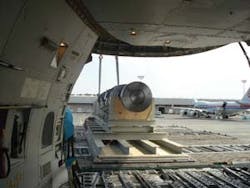The air freight industry is back in the big time. According to the International Air Transport Association, June 2010 saw a 26.5 percent improvement in international scheduled freight traffic compared with a year ago, buoyed in part by a strong recovery in Asian exports. Volumes are 6 percent above the pre-recession peak in early 2008.
The question for airlines is how to maximize the opportunities offered by this welcome escalation in business. For many, the solution centers on General Sales and Service Agents (GSSAs). Carriers are increasingly turning to them to handle their cargo business outside of the home market.
There have been plenty of deals in recent months. Active Airline Representatives has been appointed to handle sales for Saudi Airlines Cargo Company in the Netherlands. It is big business. The airline flies up to 18 B747-400F flights per week from Brussels to Saudi Arabia. Active will have online access to capacity, and will also be able to block space for regular customers as well as ad hoc deals.
Michael Meagher, executive vice president, Saudi Airlines Cargo Company says his carrier’s sales strategy throughout Europe is undergoing significant change to reflect the changing dynamics in the marketplace. “Our medium- and long-term strategy is to expand our range of freighter destinations, increase our market share, and expand our product range,” he says. “This appointment fits in very well with this strategy and I am confident it will be successful.”
Meanwhile, leading GSSA, ECS, has seen its European operations grow by 5-6 percent a year. Company turnover has increased by 50 percent in three years. New contracts include Thai Airways in France and Italy, Etihad Airlines in Italy, and Viva Macau in Asia.
Guy Tordjman, CEO, says the vision and strategy for the future are based on a simple observation: the rise of oil prices mechanically increases airline companies’ operating costs and leads to an economic situation that further increases the advantages offered by outsourcing solutions.
Integration
With Boeing forecasting that the global air cargo market will grow 5-6 percent annually over the next 20 years on the back of a 3.2 percent increase in world GDP — creating demand for almost 2,500 new and converted freighters by 2029 — there is plenty of cargo cake to go around. Airlines are increasingly looking for a one-stop solution to seamlessly handle large volumes on a global level, a strategy that the GSSA network has developed to address.
“A lot of airlines are now depending on GSSAs, especially at outstations, to reduce costs and limit their commitment to expensive offices,” says Ton Smulders, president of EGSAC (European General Sales Agency Cargo), an independent cargo GSSA network. EGSAC has 30 members in 33 countries and represents around 150 airlines.
“As GSSAs are paid on a commission basis, or sell at net rates, this makes them a flexible cost, directly related to performance — rather than a fixed cost that must be absorbed even if revenue is down,” he continues. “If they don’t perform, they earn nothing — and this in itself acts as a motivating factor.
“Also, where a carrier decides to cut frequency or downgrade to an aircraft type with a lower payload, leaving less capacity to sell, it is the GSSA who accepts the risk,” he continues. “If the carrier still has its own office, the fixed costs continue regardless of the cutback in frequency and revenue potential.”
Handling implications
Of course, the effects of a GSSA are not just felt in the sales ledger. A sales agent effectively offers a one-stop-shop for airlines. A multitude of operational requirements such as handling contracts and logistics come under their scope, guaranteeing quality and necessitating in-depth integration with an airline’s organization.
Smulders explains just how heavily influenced an airline handler can be by the services a GSSA sells: “Typically, a GSSA maintains a very close relationship with the carrier’s handling agent and supervises this handling agent by furnishing it with daily FBLs (freight booking lists) showing all booked cargo for a specific flight,” he says. “The GSSA also instructs the handling agent concerning what kind of equipment, such as containers and pallets, to use for a specific flight.”
Furthermore, GSSAs also get involved on the apron, often supervising the ramp handler during turnaround of the aircraft. It can even make decisions about which export cargo has priority in the event of unexpected payload restrictions — such as weather or high passenger loads. On the import side, the GSSA arranges trucking for the carrier where a shipment is destined for a station other than the arrival airport.
Rarely does a GSSA actually perform physical handling for a carrier, but such is the all-embracing nature of the service offering that they might appear to do so. Utilizing the carrier’s reservation system, a GSSA furnishes its client with all shipment details on a per flight basis. “If, for instance, a carrier operates out of Brussels with a freighter and cargo originates in Amsterdam, the GSSA pre-books the cargo with the carrier’s online office in Brussels, followed by updated information after delivery of the cargo to the handling agent,” explains Smulders.
“When the cargo is palletised and the truck departs to Brussels, the handling agent sends an FFM (freight forwarding message) to both the GSSA and the carrier’s online office in Brussels with all truck manifest details,” he adds.
Airlines and ground handlers
In part at least, the extensive spread and growth of GSSAs, both in the industry at large and within individual airline operations, is a result of seamless integration with carriers’ existing internal structures. What could so easily become an added layer of complexity is entirely the opposite — to all intents and purposes, a GSSA simply acts as if it were the airline.
As the GSSA works on an exclusive basis in its territory, the handling agent generally regards the GSSA as the carrier, takes instructions from the GSSA, and accepts freight and build-up information in the usual manner.
Henrik Ambak, vice president and head of ground services at Cargolux, suggests this is because the GSSA is basically regarded as a local station office by the airline. “We contract handling directly with the handling agent separate from our sales set-up whether own office or a sales agent,” he says. “However, where used the GSSA is our local station office and must therefore look after and supervise the handling activity on our behalf — be it for aircraft, trucks or cargo.”
Ambik notes GSSAs tend to be long-term partners and are often considered almost like employees. He says there is a slightly different approach to information exchange and sales price management but in practice they integrate easily into Cargolux’s structure.
“For air cargo in general the sales agent industry has grown in importance over the past decade as some airlines have been seeking to lower their sales costs,” Ambik says.
Ground handlers say much the same. There is a growing number of partnerships with GSSAs but so far they have dovetailed well with handling requirements. Swissport, for example, reports that where appropriate it receives instruction from a GSSA rather than the airline, but it makes little practical difference to day-to-day operations.
The main question now for handlers and airlines alike is whether this win-win relationship can stay the course. As third-party sales increase, the links in the value chain inevitably increase as well. Preserving that seamless integration is vital if cargo is to remain in the big time.






